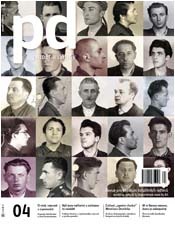Prozaická skutečnost lyrického věku. K osudům českých spisovatelů v době nástupu komunistů k moci (
The prosaic reality of the lyric age: on the fates of czech writers at the times of the communist coup
Author(s): Rudolf VévodaSubject(s): History
Published by: Ústav pro studium totalitních režimů
Summary/Abstract: Rudolf Vévoda’s overview of the development of the writers’ community and its relation to the regime at the turn of the 1940’s and 1950’s can be seen as a counterpart to Petr Hrubý’s study. While Hrubý describes how writers built the new order, Vévoda depicts the demolition of the old one. Renowned journalists such as Ferdinand Peroutka were put aside, writers and poets with a diff erent philosophy of life were silenced and the publishing of their works forbidden while they were forced to live on the verge of society socially as well as materially. Those whom the regime considered to be potential troublemakers were consciencelessly put behind bars and some of them, for example Záviš Kalandra, were executed or escaped capital punishment narrowly (as Zdeněk Rotrekl did). It resulted in the destruction of the rest of our cultural elite, which escaped the Nazi atrocities but was defenceless against the communist ones. The subsequent years of peaceful „socrealist“ creation led to a complete inhibition of other literary streams and a fatal loss of quality of the Czechoslovak literature.
Journal: Paměť a dějiny
- Issue Year: II/2008
- Issue No: 04
- Page Range: 18-23
- Page Count: 6
- Language: Czech

